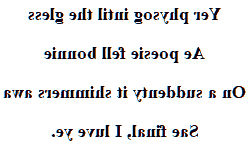Scots love poem
The Gless
Yer physog intil the gless
Ae poesie fell bonnie
On a suddenty it shimmers awa
Sae final, I luve ye.

Other version
The Leukin-Gless
Your cast in the leukin-gless
Is ma bonnie maist poem
But be swith it dwynes awa
It's ma last "A lue ye"!

→ French poem ←
Scots language
The best way to tell about my love poem translated into Scots is to speak about this language:
Scots language (Lallans, Doric, Ulster, Scotch, Braid Scots), is a Germanic language from the north of England which descend from old Northumbrian (old English from the 7th century) with Scandinavian influences; the word Lallans comes from Lawlands (Lowlands).
Scots which is the Nordic variety of the old language brought by the Anglo-Saxons, is therefore a Germanic language, which is spoken in the cities, and especially in the lowlands and in the northern islands.
The two other languages of Scotland are English (spoken throughout Scotland), and Gaelic whose linguistic area is more in the Highlands and the islands in the west.
The scots language spread from Lothian throughout the Scottish Lowlands in the Middle Ages and later to Ulster.
In the 15th century, the poets (often the kings themselves, or people of the court) composed in Scottish, a language which even replaced Latin in the administration, and it is around this time that the word "Scottish" appears to designate it.
Scottish should not be confused with Scottish English, which is a form of Standard English influenced by Scots.
Currently, Scots is spoken in the Scottish Lowlands (Lawlands ... the term Lallans is derived from Lawlands), as well as parts of Ulster ... it has a status of regional language and it is spoken by roughly 1,5 million people.
The Scots language remained closer to its original root, influenced by connecting with Lowlands of Holland and the Baltic states. Then there was the French connection, culminating with Mary Queen of Scots.
It use words like press, ashet, and in Scottish Country dancing, allemande, poussette, promenade ..... it has also of course a Gaelic influence and Norse as well.
One of the great pieces of world literature is Gavin Douglas 1476-1522, the Twelfth Books of the Eneados he makes it clear his is a Scots translation. As he had lived in England for a while, we can assume he knew what he was talking about. so by 1500 the languages were quite distinct.
If from the 17th century written Scottish would gradually be replaced by standard English, its spoken characteristics continue to be alive today. These characteristics that make people speak Scottish range from a simple accent (English-Scottish) to Scots, with different local variations that all belong to the domain of Scots, but do not prevent speakers from being able to understand each other. these variations depend on isolation or contacts with other people, with the Vikings for example (Orkney, Shetland).
We can therefore separate Scots into several areas where we speak of dialects which, depending on contacts, isolation etc. have a vocabulary or even a grammar with nuances. To name some (Doric, Caithness, Orkney or Shetland).
During this seventeenth century, London English because of its prestige will gradually become the language of the elites in Scotland, relegating Scottish to the language of the common people. Despite everything and perhaps because of this sociological separation, will remain alive, the Scots language will retain its vigor.
Scoti or Scotti is a Latin name for the Gaels of Britain and Ireland. It later, in the form Scots, came to denote the inhabitants of Scotland.
The Kingdom of Scotland emerged as an independent sovereign state in the Early Middle Ages and continued to exist until 1707. By inheritance in 1603, James VI, King of Scots, became King of England and King of Ireland, thus forming a personal union of the three kingdoms. Scotland subsequently entered into a political union with the Kingdom of England on 1 May 1707 to create the new Kingdom of Great Britain.